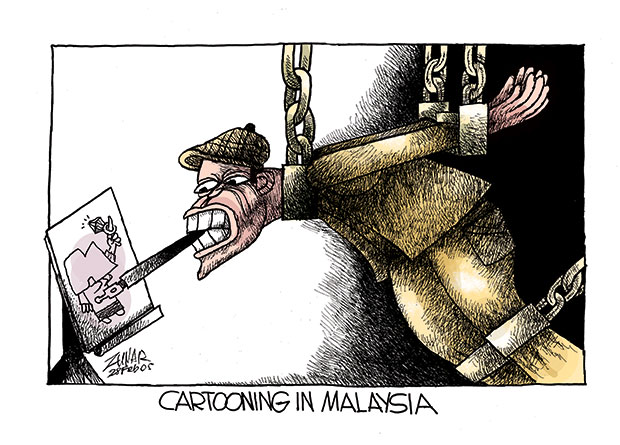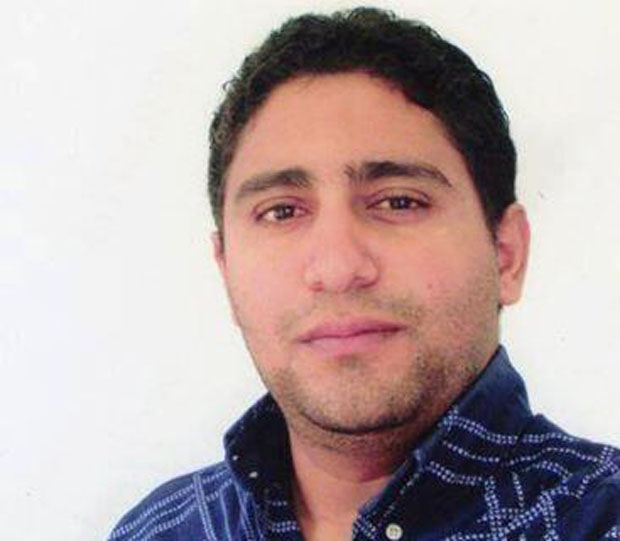Index relies entirely on the support of donors and readers to do its work.
Help us keep amplifying censored voices today.

In March, Index on Censorship commissioned cartoonists to give their take on free expression in the past 12 months. Zunar submitted the above.
Malaysian political cartoonist Zulkiflee Anwar Haque “Zunar” was charged with nine counts of sedition for tweets posted following a controversial court ruling. He could be sentenced to 43 years in prison if convicted. He pleaded not guilty. His bail was set at 13,500 RM (£2500.21).
Zunar had reported on 1 April that he has been told that he will be charged under the country’s sedition act.
“My lawyer had just informed me that the police had served a notice to charge me to court under the sedition act over my tweet posting dated 10 of February 2015 on Anwar Ibrahim ruling,” Zunar wrote in a statement ahead of the 3 April court date.
The cartoonist has been repeatedly targeted for his editorial cartoons that critique the Malaysian government, which has banned much of Zunar’s work and repeatedly subjected him to raids, arrest and detainment.
One of the tweets included a cartoon criticising Malaysian Prime Minister Najib Razak’s involvement in Ibrahim’s case. That case saw the country’s political opposition leader sentenced to five years for sodomising a former employee. Ibrahim says that the charges are politically motivated.
Cartoon Zunar: PM Najib is the judge! pic.twitter.com/3FbAZQwxVm
— Zunar Cartoonist (@zunarkartunis) February 10, 2015
According to Zunar, the charge he expects on 3 April would be under section 4(1) C of the sedition act, carrying a maximum penalty of three years in prison, a £918 fine, or both. After he posted the tweet in February, he was arrested and detained for three days. During the detention, the police also opened up separate investigation on his cartoon books Pirate of Carry BN and Conspiracy to Imprison Anwar.
Zunar said that he has been advised by his lawyer not to comment about the case in detail.
“I would like to reiterate that the use of sedition act will not silence me. I will keep exposing the corruptions and wrong-doings of the government,” Zunar wrote.
“Index calls on Malaysia to drop these latest charges against Zunar, which are a blatant attempt to stifle free expression and dissent in the country,” Index on Censorship CEO Jodie Ginsberg said.
Zunar has been subject to official harassment for his work taking corruption to task.
On 28 January, Zunar’s office was raided while he was on speaking tour in London. Authorities confiscated more than 150 books. That raid was made under printing presses and publications act, the sedition act and the Malaysian penal code.
In earlier raids on his office more than 500 copies of Zunar’s books were confiscated in two separate raids to his office by the authorities. Authorities also targeted printers, vendors and bookstores around the country and their owners were warned not to print or sell Zunar’s books.
On 6 November 2014, three of his assistants were arrested and taken to the police station for selling his latest cartoon books. A few days later, the webmaster for Zunar’s website and online bookstore was called for questioning by the police under the sedition act.
The police have asked the online payment gateway that handles his book transactions to disclose the list of customers who have purchased his books through official website, zunar.my, according to Zunar’s statement.
On 20 November, Zunar was questioned at by Kuala Lumpur police from the classified crime section. That investigation was triggered by two complaints lodged against him.
This is Zunar’s second investigation under the sedition act for cartooning — the first was in September 2010, when he was arrested and detained for two days. In addition, five of his books — Perak Darul Kartun, 1 Funny Malaysia, Isu Dalam Kartun Vol. 1, 2 and 3 — were banned by the Malaysian home minister from 2009 to 2010.
In 2011, Zunar was conferred Courage in Editorial Cartooning Award by the Cartoonist Rights Network International
In his statement, Zunar pledged that his work against corruption will continue.
“The ‘Fight Through cartoons’ will carry on with more fire. I will keep drawing until the last drop of my ink.”
This post was published at indexoncensorship.org on 1 April, 2015

The imprisonment of Jabeur Mejri over the publication of prophet Muhammad cartoons on his Facebook page is set to come to an end soon, reports Tunisian local media.
Mohamed Attia, vice-president of the Tunisian League for Human Rights (LTDH) told privately-owned radio station Shems FM that Mejri will soon be released, and that he will travel to Sweden where he has allegedly obtained political asylum. The announcement comes after civil society groups visited Mejri in prison on 21 January.
The initiative was led by the International Federation for Human Rights (FIDH) and included representatives from the LTDH, the Tunisian Forum for Socio Economic Rights (FTDES) and Mejri’s support committee.
Mejri has been in prison for nearly two years for posting cartoons of the Prophet Muhammad on his Facebook page. He was sentenced to a seven-and-a-half year jail term for “publishing material liable to cause harm to public order or good morals”, “insulting others through public communication networks” and “assaulting public morals”.
His friend Ghazi Beji, who received the same sentence in absentia after fleeing the country, obtained political asylum in France last year.
“I cannot enjoy my freedom in Tunisia. So, I have to leave my country,” Jabeur told Henda Chennaoui, a member of his support committee, during last week’s visit.
But in order to leave the country, Mejri must first obtain a presidential pardon. Despite Tunisian president Moncef Marzouki promising this on a number of occasions, he has so far not kept his pledge.
Meanwhile, Tunisia’s National Constituent Assembly (NCA) overwhelmingly approved a new constitution on Sunday. Though the charter enshrines freedom of expression, provisions that restrict free speech over religious issues have raised concerns.
Article 6, on freedoms of belief, conscience and religious practice, tasks the State with “protecting sanctities”. The article was expanded in early January to ban “Takfir” (apostasy accusations), at the request of opposition representatives in the NCA. The same article was further amended last week to prohibit the “undermining of sanctities”.
“The state sponsors religion, guarantees freedom of belief and conscience and religious practices, protects sanctities, and ensures the neutrality of mosques and places of worship away from partisan instrumentalisation. The state commits to spreading values of moderation and tolerance, and to protect the sacred and prevent its undermining. [The state] also commits to ban and fight accusations of apostasy (“takfir”) hate speech and incitement violence,” it states.
“Article 6 remains the shame of this constitution: a clear and definite restriction of free speech,” Amira Yahyaoui, president of human rights NGO Albawsala, tweeted on 23 January.
“There are several vague points that open the door to the return of censorship, especially with the establishment of the protection of the Sacred [notion],” Lotfi Azouz, director of the Tunis bureau of Amnesty International said at a press conference on Saturday. Free speech provisions in the constitution are “chained up by principles that could harm this freedom”. He further added that article 6 “establishes censorship in the name of protecting the sacred”.
Sunday Times editor Martin Ivens yesterday issued an apology for publishing a cartoon by Gerald Scarfe depicting Israeli Prime Minister Binyamin Netanyahu.
The cartoon, which appeared in the paper as Britain marked Holocaust Memorial Day, showed the Israeli leader building a wall, and crushing Palestinians in the process. With its blood splashes and thuggish, brawny depiction of Netanyahu, the cartoon was, in the words of a Sunday Times spokesperson (before the apology), a “typically robust” piece of work by Scarfe.
The editor’s apology came after public criticism from his proprietor, Rupert Murdoch, who tweeted “Gerald Scarfe has never reflected the opinions of the Sunday Times. Nevertheless, we owe major apology for grotesque, offensive cartoon.”
It does seem slightly odd to apologise for a “grotesque, offensive” cartoon. As Martin Rowson (who draws strips for Index on Censorship magazine) points out in this article, and this Free Speech Bites podcast, cartoons are usually, by their very nature grotesque, and often offensive (to borrow a phrase from Woody Allen, at least if they’re done right).
Did this cartoon, however, cross a line? Lord Sacks, the chief rabbi, put out a statement, saying:
“The deplorable cartoon published in The Sunday Times on Holocaust Memorial Day, whether antisemitic or not, has caused immense pain to the Jewish community in the UK and around the world. Whatever the intention, the danger of such images is that they reinforce a great slander of our time: that Jews, victims of the Holocaust, are now perpetrators of a similar crime against the Palestinians. Not only is this manifestly untrue, it is also inflammatory and deeply dangerous.”
But Israeli journalist Anshel Pfeffer at Ha’aretz says that, while it may have been unpleasant, it did not contain any of the anti-Semitic blood libel and Nazi imagery that characterises genuinely Jew-hating cartoons.
Moreover, Scarfe has not notably singled out the Israeli leader for special treatment — a glance through the cartoonists archives shows portrayals of many equally blood-spattered world leaders (take, for example, this horrendous but riveting image of Bashar Al Assad, drenched in the blood of children)
Scarfe has apologised for the timing of the cartoon, though some, including Pfeffer, will say that Israeli leaders should not be immune from criticism on Holocaust Memorial Day.
Context is crucial in any debate over free speech and offence.
In 1981, far-right cartoonist Robert Edwards was given a 12-month sentence for “”aiding and abetting, counselling and procuring the publication of material likely to incite racial hatred”.
Robert Edwards’s work was unsubtle to say the least. The conviction came after the one off publication of a comic aimed at children called “The Stormer” (I did say he was unsubtle). The comic contained such delights as “”Billy the Yid”, and “Dresden and Auschwitz — The Facts!”, as well as strips targeting black and Asian people.
More recently, in 2009, Simon Shepherd and Stephen Whittle were convicted for several offences including pushing a leaflet entitled Tales of the Holohoax through the door of a Blackpool synagogue.
It is clear that Scarfe’s blood-spattered commentary on Netanyahu was quite different to the output of Edwards, Whittle and Shepherd (and there is another discussion to be had about free speech in those cases).
As such the intervention by 20 MPs writing a letter demanding an apology from the Sunday Times is a dismayingly knee-jerk reaction. As was Murdoch’s tweet.
At Index on Censorship’s Taking the Offensive conference yesterday, hundreds of artists discussed their fears of expressing themselves, lest they fall foul of local politicians, commercial sponsors, community leaders or even a Twitter mob. The censorious will always tend towards the literal, a mindset rather unsuited to the reading of the exaggerated, ironic world of art, including political cartooning.
Martin Rowson is an award-winning cartoonist, writer and satirist in the tradition of Swift and Gillray. Here he talks to Nigel Warburton about humour, satire and offence saying:
I think there are people crying out to be offended by things